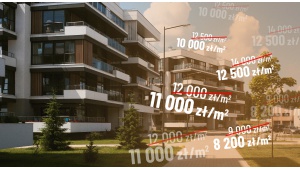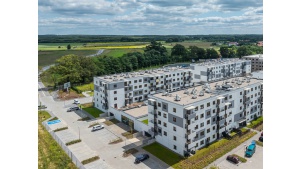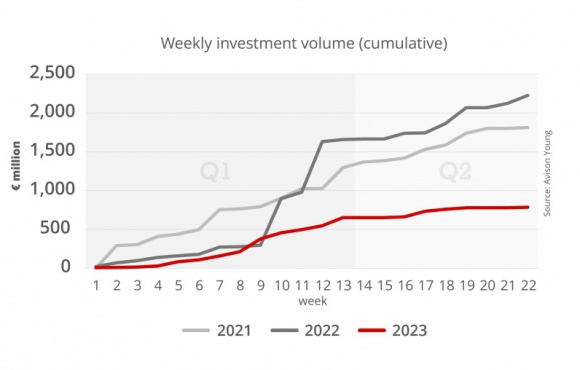Polish market after 5 months - where are we at?
Prestige PR
Włodarzewska 81C lok 81
02-393 Warszawa
i.wisniewska|prestigepr.pl| |i.wisniewska|prestigepr.pl
508 927 958
www.prestigepr.pl
We are approaching the halfway point of 2023. Before the semi-annual investment market reports are released, Avison Young is sharing the current results.
Authors: Paulina Brzeszkiewicz-Kuczyńska (Research and Data Manager) and Marcin Purgal (Senior Director, Investment)
Market adaptability
The current results do not look much optimistic. However, this is a temporary state. Poland’s real estate market has stable foundations, and investors are highly adaptable, which is confirmed by the results achieved in previous years. Let's take a quick look at how the market has responded to the challenges emerging in the last 3 years.
COVID-19 had a huge impact on the economy and customers behaviour, which naturally translated into the real estate market and investors’ activity. In the face of restrictions and the growing importance of staying local, customers more often chose “convenience retail” than shopping centres; home office and the hybrid work model developed. The growing pandemic boosted e-commerce (according to the Statistics Poland, the share of online shopping doubled in just two months from 5.6% in January and February 2020 to nearly 12% in April 2020), which in turn influenced the dynamic development of the industrial sector.
However, investors relatively quickly adapted to the new conditions, and the total investment volume in 2020 amounted to EUR 5.3 billion and EUR 5.9 billion in 2021. Certainly, these results were lower than the volumes from 2018 and 2019, but they secured the 3rd and 4th highest position in terms of volume in the history of the market.
In 2020, investors focused on “core” office buildings, warehouse portfolios and retail parks. In 2021, we saw record market liquidity (166 transactions) and - due to the prolonged period of the pandemic – a shift in investors' attention to opportunistic transactions in shopping centres and office buildings.
In 2022, the outbreak of war in Ukraine triggered further market turmoil, record high inflation, rising interest rates and escalating investment uncertainty. Nevertheless, this challenging year ended with a volume close to 2021’s (5.8 billion), which once again confirmed the maturity and liquidity of Polish real estate market. During the noticeable slowdown and the wait-and-see strategy adopted by investors, the market saw 5 historically large transactions accounting for 40% of the total investment volume, including the sale of prime Warsaw office buildings (The Warsaw Hub and Generation Park Y), the first since 2018 major prime shopping centre transaction (Forum Gdańsk), the sale of Danica warehouse portfolio and the creation of two JVs by EPP. For
comparison, the decline in transaction volumes compared to 2021 in Western Europe reached an average of nearly 20%, and in the region of Central and Eastern Europe less than 3%.
In 2022, investors turned their attention to regional markets outside the main cities, which applied to all real estate sectors. Office buildings in the regions accounted for 68% of transactions and 50% of the total volume on the office market. In the industrial sector, 40% of the volume concerned facilities outside the largest warehouse hubs. Transactions of shopping centres in medium-sized cities appeared on the retail market, but new players continued to focus on safe retail parks.
Current status
We are estimating that the volume of closed transactions announced publicly from the beginning of this year to the end of May, amounted to only around EUR 800 million. For comparison, in 2021 and 2022, the volume of transactions in the same period amounted to over twice as much. There were no historically large transactions, which in the first quarter of 2022 (The Warsaw Hub, EPP’s two joint venture investments) alone accounted for 75% of the total volume.
Nevertheless, compared to the countries of Central and Eastern Europe, we still remain the most attractive and liquid market.
Offices slowed down
On the office market, only 7 transactions were concluded during this period, concerning “core +” and opportunistic buildings located in Warsaw, outside the city centre. Avison Young investment team represented the seller in the divestment of Celebro and Wola Retro buildings.
Sale & leaseback at warehouses
Since the beginning of the year, the dominance of the western regions in terms of location, mainly Lower Silesia, is clearly visible in the industrial sector. In turn, in the last 2 months, sale & leaseback transactions prevailed. Portfolio transactions are yet to be recorded.
Retail parks decelerate
In the first 5 months of 2023, only one retail park transaction was completed and announced. In the first quarter, opportunistic smaller shopping centres and redevelopment schemes were the most popular. An example of such a transaction may be the sale of 4 commercial facilities portfolio located in Koszalin, Szczecin, Wałbrzych and Strzegom, where the Avison Young team represented the seller.
In turn, in the last 2 months, the subjects of the announced transactions were large-format retail properties: 3W portfolio and Castorama in Płock.
Strategies of banks and strategies of buyers
“One of the reasons for the reduced number of transactions and volume in the first 5 months of 2023, is that the process of adjusting price expectations on the seller-buyer line is still ongoing. However, we can see the first signs indicating that this situation may improve by the end of the year - says Marcin Purgal, Senior Director, Investment at Avison Young. - Banks, although still very selective, are analysing new financing products more and more efficiently. The situation related to interest rates seems to be quite predictable, inflation is slowing down, but it still takes time for the market to stabilize and get back on track. Currently, many buyers are trying to take advantage of the market situation and place bids far below property valuations, hoping to get a good deal. However, many sellers are in no rush to sell. That changes when the seller has to liquidate the fund, funding runs out, the property stops performing, or someone fails.”
What awaits us in the second half of the year?
We expect that in the second half of the year, the commercial real estate market in Poland will be dominated by opportunistic and “value add” assets in every sector. Nevertheless, the best office buildings, whether in Warsaw or in major regional cities, as well as warehouses, should also be of interest to investors.

Deweloperzy ukrywają ceny mieszkań. Z troski o klientów czy swoje portfele?

Więcej przestrzeni, mniej hałasu – dlaczego Polacy coraz częściej wybierają przedmieścia?

Jak czytać rzuty mieszkań i uniknąć przykrych niespodzianek? AI ułatwia wybór
Więcej ważnych informacji
 Jedynka Newserii
Jedynka Newserii

 Jedynka Newserii
Jedynka Newserii

Handel

Polskie MŚP otrzymają większe wsparcie w ekspansji międzynarodowej. To cel nowej inicjatywy sześciu instytucji
Firmy z sektora małych i średnich przedsiębiorstw otrzymają kompleksowe wsparcie na potrzeby zwiększania konkurencyjności na arenie międzynarodowej. Taki jest cel wspólnej inicjatywy instytucji zrzeszonych w Grupie PFR pod szyldem Team Poland. Obejmuje ona zarówno wsparcie kapitałowe, w postaci gwarancji, pożyczek czy ubezpieczenia, jak i doradztwo oraz wsparcie promocyjne i informacyjne, dzięki czemu mikro-, małym i średnim firmom łatwiej będzie podjąć decyzję o ekspansji zagranicznej. Pierwszy projekt dotyczy wsparcia dla firm zainteresowanych uczestnictwem w odbudowie Ukrainy.
Bankowość
RPP zgodna co do potrzeby obniżania stóp procentowych. Trwają dyskusje dotyczące tempa tych decyzji

W lipcu Rada Polityki Pieniężnej po raz drugi w tym roku obniżyła stopy procentowe, określając swój ruch mianem dostosowania. W kolejnych miesiącach można oczekiwać kolejnych obniżek, ale ich tempo i termin będą zależeć od efektów dotychczasowych decyzji i wzrostu płac. Docelowo główna stopa procentowa ma wynosić 3,5 proc. Te okoliczności sprzyjają kredytobiorcom.
Handel
Umowa z krajami Mercosur coraz bliżej. W. Buda: Polska nie wykorzystała swojej prezydencji do jej zablokowania

– Polska podczas prezydencji w Radzie UE nie wykorzystała szansy na obronę swoich interesów w sprawie umowy z krajami Mercosur – ocenia europoseł PiS Waldemar Buda. W jego ocenie polski rząd, mimo sprzeciwu wobec zapisów umowy, nie zbudował w UE sojuszy niezbędnych do jej odrzucenia. Porozumienie o wolnym handlu spotyka się przede wszystkim z protestami europejskich rolników, którzy obawiają się zalania wspólnego rynku tańszą żywnością z krajów Ameryki Południowej. Według europosła wszystko może się rozegrać w najbliższych tygodniach.
Partner serwisu
Szkolenia

Akademia Newserii
Akademia Newserii to projekt, w ramach którego najlepsi polscy dziennikarze biznesowi, giełdowi oraz lifestylowi, a także szkoleniowcy z wieloletnim doświadczeniem dzielą się swoją wiedzą nt. pracy z mediami.




![Część środków z Planu Społeczno-Klimatycznego trafi na walkę z ubóstwem transportowym. Organizacje branżowe apelują o zmianę priorytetowych projektów [DEPESZA]](https://www.newseria.pl/files/1097841585/rower3,w_85,_small.jpg)




.gif)

 |
| |
| |
|